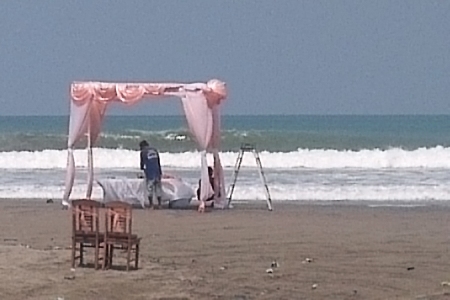Bali has many attractions to tempt visitors. Its culture is alluring, the scenery is stunning – once you get away from the The Great Southern Urban Blight – and the opportunities to relax are boundless. With proper planning, sustainable policies and infrastructure that matches its population, it could be fabulous.
Good planning would mean that hotel and condominium permits are curtailed to match demand. Instead, permits are issued at the whim of Regents who can not see beyond the windfall of the ‘special fees’ that such permits deliver. The resulting oversupply of beds means that competition for guests is fierce.
But instead of competition driving down the high room tariffs, hoteliers have been told by the government that a ‘fixed price’ regimen is to be implemented for accommodation. Ostensibly to maintain the perception of ‘quality’, the real reason is obvious. Lower room tariffs mean a reduction in the government tax take. Hoteliers are now being threatened with loss of their star rating if they reduce prices in line with the normal rules of supply and demand. A modicum of long-term planning could have avoided this ridiculous situation.
Good planning would also mean that supplies of electricity and water were sufficient for both the existing and the projected population. It would also involve introducing methods of conserving and recycling both water and energy. Proper planning would avoid the situation we see regularly here – load-shedding power blackouts, a poor water supply and distribution system, and salt-water contamination of ground wells. But there is little evidence of any such planning.
Good planning would mean that purchasers of cars here would have to demonstrate that they actually have somewhere to park the things, instead of clogging up every narrow road and gang outside their garage-less dwellings. Pro-active registration policies could reduce the increasing numbers of over-sized private cars, bought for status – and invariably on credit – which try to squeeze into narrow streets, causing monumental traffic jams.
Good planning, and proper information channels, would mean that owners of restaurants, stalls and other businesses would know in advance when visitor peaks are expected. Right now, the owners of hundreds of businesses are staring glumly out into the streets, wondering where their customers are. They are oblivious to the dates of school holidays and other tourism-drivers, because no-one has told them and they haven’t bothered to find out. So they let their staff go, without pay, until suddenly the tourists are back and everyone is under-staffed and under-stocked. There is no planning for peaks and troughs, and so the mad oscillations continue.
I fear that planning, at any level, is not one of Bali’s strengths. The government seems to show little evidence of strategic long-term planning, and individuals seem to show little tactical planning ability. When action is taken, it tends to be reactive, and there seems to be little understanding of the consequences of those actions. Maybe that’s why there is so much back-flipping on policies, so many abandoned projects and so much confusion here.
Sitting and watching preparations for a wedding at a little beach restaurant in Petitenget, I witness a perfect example of the ‘no planning’ mindset that seems to afflict Bali. In this microcosm of what is happening here on a larger scale every day, I watch a group of industrious lads meticulously setting up a marquee and table on the beach sand. They have been doing this for the last 90 minutes, perhaps ten metres from the water. The tide is coming in.

Planning Ahead – Time And Tide Wait For No Marquee
One of the wedding planners wanders over from the restaurant, speaks to the workers and gestures at the incoming waves. The lads stare out to sea for 5 minutes, verify that they are indeed waves out there, then shrug and continue working.
The next wave swamps the marquee and table and saturates the carefully arranged tablecloth. The boys, bemused, move the whole outfit 3 metres back and start re-setting the decorations and replacing the wet stuff. The tide is, not surprisingly, still coming in. In fact, the high-tide mark, clearly visible, is a good 20 metres shoreward, but this does not seem to register with them or affect their endeavours.
Ten minutes later, as I am leaving, the water is again lapping at the legs of the marquee. The boys, Canute-like, stare out to sea and will the tide to retreat. Inexplicably, it doesn’t, and they painstakingly shift the whole edifice back another 3 metres.
I don’t know how many iterations of this little drama occurred, because I left, unable to watch the inevitable. But I’m willing to bet it was at least three more …
I wonder if education might help. If schools and colleges encouraged their students to plan ahead, use logic, understand consequences, and gave them the tools to do this, would this change the paradigm? Would this result in a new generation better able to plan for Bali’s growth?
Or is what I keep seeing here just “The Bali Way”, and therefore unchangeable?

